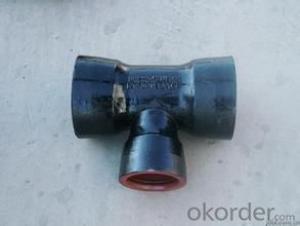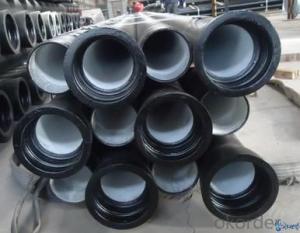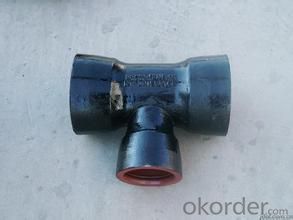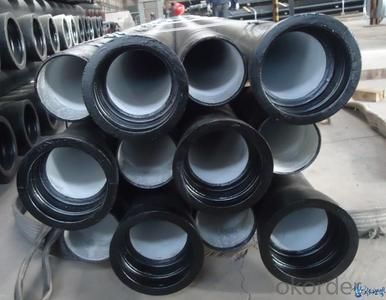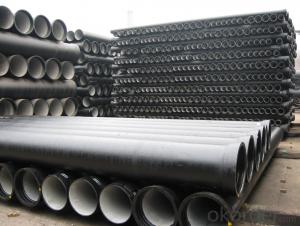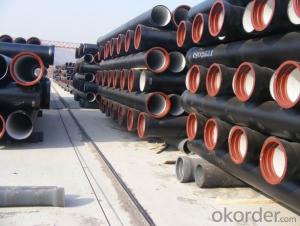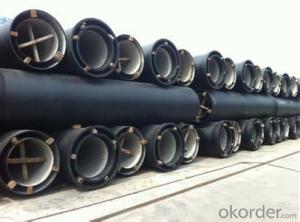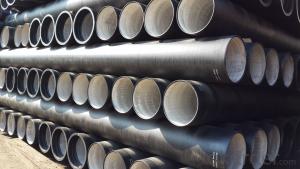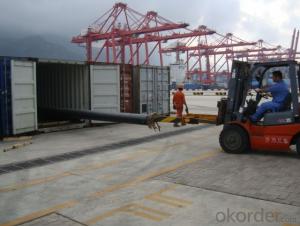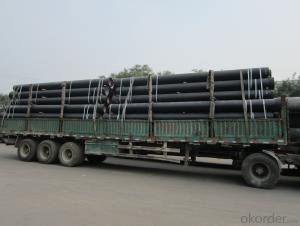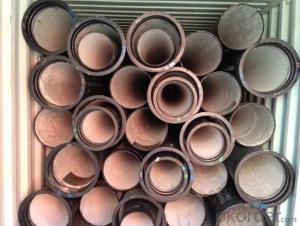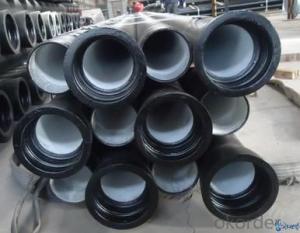DUCTILE IRON PIPESC Class DN400
- Loading Port:
- China Main Port
- Payment Terms:
- TT OR LC
- Min Order Qty:
- -
- Supply Capability:
- -
OKorder Service Pledge
OKorder Financial Service
You Might Also Like
Ductile Iron Cast Pipe is without any defects compare with tradition casting tech, which has many advantages particularly as follow:
(1) High density. In the "vertical upward casting" process, the melt iron of centre liquid column in center crystallizer is continuously feeding for volume shrinkage caused by condensation tube at outer circumference , which lead to be free of shrinkage porosity.
(2) High purity. When melt iron pouring, the mixed impurities such as gas, dross, sand grain which are lighter than melt iron could be eliminated at furnace mouth, its impossible to enter into the crystallizer through the channel, so the melt iron into the crystallizer is very pure.
(3) Strength with toughness. The cooling speed provided by continuous crystallizer is 30 times than sand casting and 5 times than centrifugal casting, and doesn't produce white iron, the eutectic cell volume of continuous cast iron is one eighth to one tenth compare with traditional cast iron. The density of graphite nodule in ductile iron can reach 300-700 pcs/mm2. Therefore, all reason above improve the strength and toughness of continuous cast iron.
(4) Free machining. The high speed cooling make the hardening phase (such as boride, steadite) not appear like reticular, massive or thick, but diffuse like fish bone and pane in shape, moreover, there are tiny graphite flakes inlaid hardening phase. It's free machining in BrinellHardness the range of 250-300HB. However, the Brinell Hardness of 250 is top limit to common metal materials.
(5) Uniform composition of tube wall. The convection mixing of liquid column caused by marching type drawing in crystallizer make the composition of tube wall well-distributed, and concentration gradient very little.
(6) High productivity. To the wall thickness of tube under 10mm, the speed of continuous casting is 1 meter/min, to the wall thickness of tube under 20mm, the speed of continuous casting is 0.5 meter/min, which is high efficiency that centrifugal or other casting tech couldn't reach.
- Q: Can ductile iron pipes be used for offshore oil and gas installations?
- Yes, ductile iron pipes can be used for offshore oil and gas installations. Ductile iron is a type of cast iron that offers excellent strength and durability, making it suitable for various applications including offshore environments. These pipes have high tensile strength and are resistant to corrosion, making them ideal for transporting oil and gas in harsh offshore conditions. Ductile iron pipes are often used for subsea pipelines, risers, and flowlines due to their ability to withstand high pressures and resist external forces such as waves, currents, and impacts. They are also capable of handling the high temperatures and pressures associated with offshore oil and gas production. Furthermore, ductile iron pipes have a long service life and require minimal maintenance, reducing the overall operating costs for offshore installations. They are also readily available and cost-effective compared to other materials such as steel. However, it is important to consider factors such as the specific requirements of the project, environmental conditions, and the compatibility of ductile iron with other materials used in the offshore installation. Proper engineering analysis and design considerations should be undertaken to ensure the suitability and safety of ductile iron pipes for offshore oil and gas installations.
- Q: How does ductile iron pipe perform in areas with high soil erosion?
- Ductile iron pipe is renowned for its remarkable strength and durability, rendering it a dependable option for regions experiencing extensive soil erosion. With its distinctive composition, including graphite nodules, it possesses the capacity to be both pliable and resistant to fractures or cracks, even in demanding environments. Consequently, ductile iron pipe is highly capable of enduring the impact of soil erosion. In regions with high soil erosion, the surface of the pipe can potentially be scraped by soil particles, leading to abrasions or damage. However, ductile iron pipe's substantial wall thickness and corrosion-resistant coating effectively serve as a barrier against these abrasive forces. Consequently, even in regions with considerable soil erosion, ductile iron pipe can maintain its structural integrity and functionality. Additionally, the ability of ductile iron pipe to resist corrosion further augments its performance in areas with high soil erosion. Soil erosion frequently results in increased moisture content, which can expedite the corrosion process for certain materials. Nonetheless, ductile iron pipe's protective coating, typically composed of zinc or epoxy, acts as a shield against corrosion, ensuring prolonged performance and reliability. To summarize, ductile iron pipe exhibits exceptional performance in regions with high soil erosion due to its strength, flexibility, and resistance to fractures or cracks. Its substantial wall thickness and corrosion-resistant coating make it highly durable against abrasive forces and corrosion, enabling it to withstand the challenges posed by soil erosion. Consequently, ductile iron pipe is a dependable choice for infrastructure projects in these areas, offering long-lasting and efficient water and wastewater transportation systems.
- Q: How to control mortar proportioning in ductile iron pipe cement coating
- The mix ratio of cement coated mortar for ductile iron pipes refers to the weight ratio of various raw materials consisting of ductile iron pipes and cement coated mortars.
- Q: How are leaks repaired in ductile iron pipe?
- Leaks in ductile iron pipe are typically repaired by cleaning and preparing the area around the leak, applying a suitable sealant or epoxy, and then securely fastening a repair clamp over the affected area. This clamp provides a tight seal and prevents any further leakage.
- Q: Can ductile iron pipes be used in marine environments?
- Yes, ductile iron pipes can be used in marine environments. Ductile iron is highly resistant to corrosion and can withstand the harsh conditions found in marine environments, making it an ideal choice for piping systems in such settings.
- Q: What is the typical lifespan of ductile iron pipe?
- The lifespan of ductile iron pipe can differ based on several factors, including the pipe's quality, the conditions it faces, and the maintenance practices employed. On average, ductile iron pipe typically lasts about 100 years. This longevity is a result of its inherent strength and durability, allowing it to withstand high pressure and various environmental conditions. Furthermore, ductile iron pipe is often coated with protective materials like cement mortar lining or polyethylene encasement, which further enhance its durability. Regular inspections and maintenance can also contribute to extending the lifespan of ductile iron pipe by promptly identifying and addressing any issues or potential damages.
- Q: DN300 how long is it for water polo and iron pipes?
- Blue interface cast iron pipe, blue fixed inner cushion rubber, blue gasket seal; rigid joint like cast iron pipe mouth, compared with straight pipe inserted cement sealing process, has been basically eliminated
- Q: How can the old water pipe ductile iron pipe be opened with three flanges?
- Cast iron pipe is not good then did not take the treatment is not good in the local search do you master plumbing to the scene to see the actual situation, some teachers have you unexpected strain interpretation way.
- Q: Are ductile iron pipes suitable for sewage treatment plants?
- Ductile iron pipes, without a doubt, prove to be an appropriate choice for sewage treatment plants. The material itself, known for its strength and durability, can endure the challenging conditions commonly encountered in such facilities. It boasts high tensile strength and exceptional resistance to corrosion, safeguarding it against the destructive influence of sewage and various chemicals present in wastewater. Furthermore, the smooth interior surface of ductile iron pipes facilitates the efficient flow of wastewater, thus minimizing the likelihood of clogs or blockages. Their installation and maintenance procedures are also hassle-free, rendering them a cost-effective alternative for sewage treatment plants. When it comes down to it, ductile iron pipes emerge as a dependable and enduring solution for the transportation of sewage within these establishments.
- Q: Can ductile iron pipes be used for dam construction?
- Indeed, dam construction can utilize ductile iron pipes. Renowned for their robustness, longevity, and resistance to corrosion, these pipes prove apt for various purposes, including the construction of dams. They exhibit remarkable resilience under intense pressure, rendering them perfect for transporting water and other fluids throughout the dam's framework. Moreover, their capacity to withstand external forces and ground shifts establishes them as a dependable option for dam construction. Furthermore, the relative ease of installation and maintenance of ductile iron pipes enhances their appropriateness for dam construction endeavors.
Send your message to us
DUCTILE IRON PIPESC Class DN400
- Loading Port:
- China Main Port
- Payment Terms:
- TT OR LC
- Min Order Qty:
- -
- Supply Capability:
- -
OKorder Service Pledge
OKorder Financial Service
Similar products
Hot products
Hot Searches
Related keywords
